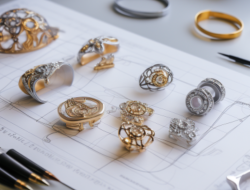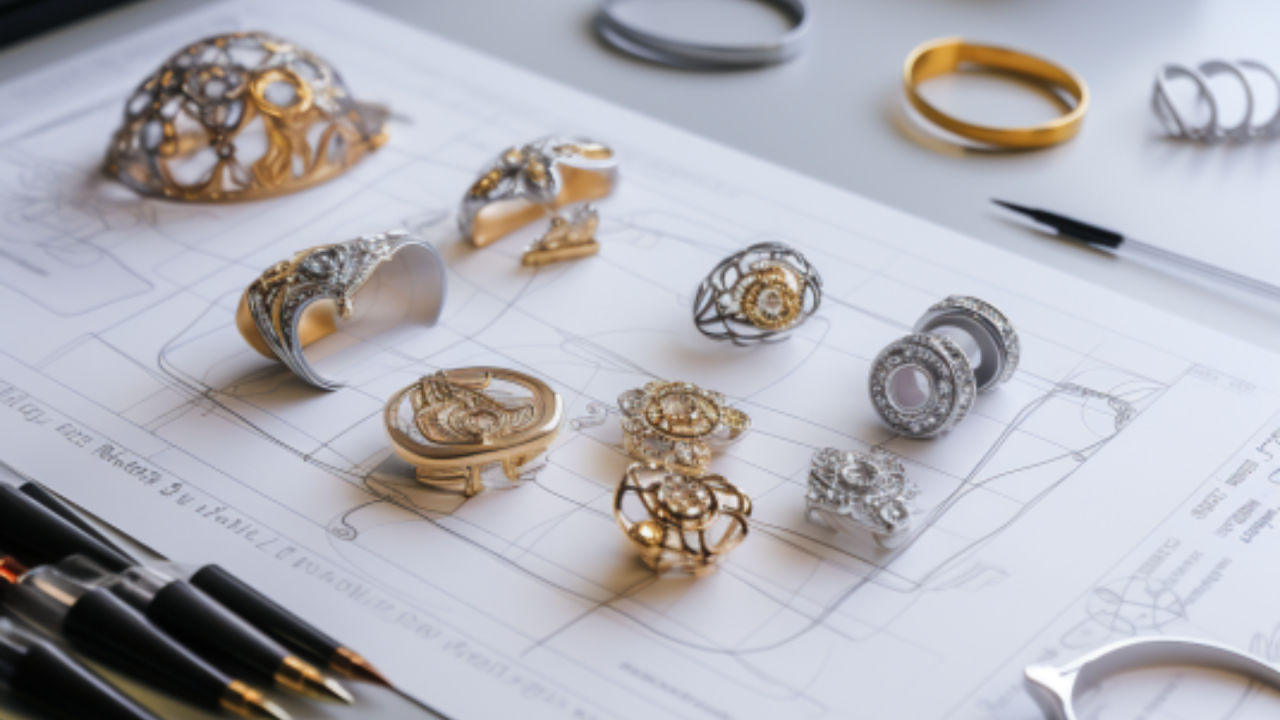The Relevance Between Technology and Jewelry Design – Jewelry design is usually viewed only from an artistic point of view, and jewelry is seen as an expression of the designer’s artistic talent. How does technology fit into this scenario? Of course, there is design and technology involved in jewelry, but are they connected?
The Relevance Between Technology and Jewelry Design

swarovskijewelry – What is the relationship between design and technology? In this presentation, I try to explore this relationship in jewelry, with some emphasis on the role of technology in innovative design. I hope to show that technology is irrelevant to creative design and that each technology complements the other.
Market research shows that today’s women want innovation and quality in their lives, and this also applies to the jewelry they wear – or carry. Of course the quality and workmanship must be good, and most importantly the design must be innovative. It might even show some interesting “new” effects. This must also be done in an environmentally friendly and safe manner. One thing is clear to all of us in the jewelry industry: we understand the importance of innovative design in our business. Without innovative design, we risk losing competitive advantage and losing business.
Jewelry design is usually viewed only from an artistic point of view, and jewelry is seen as an expression of the designer’s artistic talent. How does technology fit into this scenario? Of course, there is design and technology involved in jewelry, but are they connected? What is the relationship between design and technology? In this presentation, I try to explore this relationship in jewelry, with some emphasis on the role of technology in innovative design. I hope to show that technology is irrelevant to creative design and that each technology complements the other.
The relationship between design and technology
As many of you here know, I’m a metallurgist by training – a tech by training. tasked with spreading technology and best practices in the materials and processes used in jewelry making. I don’t care much about jewelry design and my artistic skills are very simple!
As a technologist, I have long been interested in the relationship between design and technology and tried to figure it out. know what it is. can happen In this context, I use the term “technology” to encompass the machine-based processes and advanced craftsmanship involved in making jewelry in the traditional way.
Both approaches require a good understanding of the nature and properties of gold if we are to make good use of our production capabilities. Lifting classical objects can be a good example of manual skill in a technical sense. This can only be achieved by understanding the material and its mechanical behavior.
There are parallels here with artists in other fields such as painters, sculptors, and potters. A painter must understand his materials and tools – canvas, paints and their interactions, various painting techniques, hand skills, the importance of light, perspective and color combinations, etc., if he is to express his ideas in the desired way. Likewise with a sculptor or potter who makes ceramic objects.
Therefore, it is hopefully clear that making good professional jewelry requires that the designer master the materials, tools and techniques used to make the jewelry, for example. it must be of high quality. technical qualifications. This is the first clear connection between design and technology – the implementation of a design idea relies on technology to make it a reality.
To explain further, there are a few things to consider.
Firstly, I believe it is a clear connection between design and technology. it is important for jewelry designers to understand the different technologies and their possibilities and limitations. . Many goldsmiths and jewelry companies have experience with interesting designer “paper designs” that practically cannot be made economically. Additionally, many investment creators have experiences that are designed to provide investment, but are not disposable.
Here I would like to mention that it is important for manufacturers to achieve good physical qualities of their jewelry, namely good craftsmanship and workmanship. , so the design can be considered successful. This also requires the use of technology, both materials and manufacturing technology, and is the main reason why the World Gold Council implements its various technology programs, such as Gold Technology and the publication of technical manuals and implementation of technical programs. . seminars around the world.
When we talk about jewelry design, we must remember that design has two aspects. We tend to think of jewelry design as artistic design, and most computer-aided design (CAD) systems used in jewelry design originate from this artistic approach. [1] The increasing use of CAD by designers illustrates another aspect of the relationship, namely the use of technology to facilitate artistic design and speed up the process. Entering the market will of course be facilitated by the addition of rapid prototyping techniques.
However, we must not forget that jewelry design also has a technical dimension. Like cars, airplanes and other technical products, jewelry must be functional and fit for its intended purpose.
Jewelry must be planned! It must be strong enough to withstand this treatment. Some jewelry, such as fishtail chains, should be flexible and not tangle when worn. Spring bolts must be strong and reliable. John Wright discussed this previously at the 1997 Santa Fe Symposium for those who want a more detailed explanation. Designing jewelry for ease of manufacture is another dimension here. Technical design is thus another link between design and technology. This is a much overlooked aspect of the industry, as discussed by John and Timo Santala.
Innovative design and technology
Let me develop this link further. Take, for example, innovative design concepts and the desire for attractive and efficient product forms and their relationship with technology. We must understand that technology can play an important role in achieving design innovation.
The classic rotating iron developed by Neissing in Germany was an important design innovation several years ago, as many others imitated and adapted it. Their manufacture is only possible if the mechanical properties of gold are understood in detail and how they can be controlled to hold the disassembled stone firmly in place without any support other than the compressive force exerted by the edge of the ring. a stone. Therefore, this innovative design relies heavily on the use of technology. I will expand on this topic soon.
Baca juga : Dampak AI Pada Industri Perhiasan dan Aksesoris
Technology Enables New Design Possibilities
In this section, I look at some new (and not so new) technologies, both materials technologies and process technologies, and show how they also provide design possibilities. . I will use some of them to show how they can also be used to create Mokume Gane type color combinations.
I’ll start with the process technology — electroforming. It’s a technology that’s been around for a long time, although it has advanced a lot in recent years, as I discussed in a recent AJM article. [4] It is important to visualize electroforming as a unique process, not simply an alternative to other processes such as stamping or lost wax casting. Each technique has its own advantages from a design point of view.
Electroforming offers unique opportunities for creative designers, and some jewelry manufacturers, such as Charles Garnier of France, have built a reputation for producing high-quality electroformed jewelry. Thin, hollow, light, thick and complex three-dimensional shape electronic molding is unmatched. This enables the implementation of projects at reasonable costs that would not be possible with other technologies.
Baca juga : Bagaimana Konten Buatan AI Mempengaruhi Pembuat Konten
Cable production
A relatively new process technology in the jewelry industry is wire production, in which several wires are twisted in a spiral shape. The current trend is to use gold cords instead of chains, especially for heavy pendants. This was an opportunity for designers to break away from the traditional chain necklace design philosophy. Cable manufacturing technology for the electrical cable industry is adapted to the needs of the jewelry industry. Consider how the use of rusted gold wires in different colors to create cables offers interesting design possibilities. Perhaps using threads in Spangold shape memory material could create an interesting surface structure!
Weave and weave
Another new processing technique in jewelry is weaving precious metal threads to make knitted metal fabric. The chain technique is also used to produce similar chain mail type fabrics. Among the winners of the Kultavirtuosit design competition are several examples of weaving. It describes the design options available. In addition, this technique, like wool weaving, can be used to weave combinations of colored gold threads and threads of other precious metals into unique patterns, thereby expanding design possibilities.

